
Related
Topics
Guests
- Peter Kornbluhdirector of the National Security Archive’s Chile Documentation Project at George Washington University.
On the 50th anniversary of the U.S.-backed military coup in Chile that deposed democratically elected socialist leader Salvador Allende, we discuss the U.S. contribution to the coup and declassified records obtained by the National Security Archive’s Chile Documentation Project with Peter Kornbluh. His book, The Pinochet File: A Declassified Dossier on Atrocity and Accountability, has been revised and published in Chile for the first time. “There’s a lot known about the U.S. role in Chile, but there’s a lot to be reminded of, as well, and then there are the secrets that remain,” says Kornbluh, who says countries around the world must learn from Chile’s history to counter growing misinformation and authoritarianism today. “Very authoritarian voices are rising to dangerous levels that actually threaten our democracy.”
Transcript
AMY GOODMAN: This is Democracy Now!, democracynow.org, The War and Peace Report. I’m Amy Goodman, as we turn again to Chile, which on Monday marked the 50th anniversary of the U.S.-backed military coup that overthrew the democratically elected socialist President Salvador Allende and ushered in a 17-year dictatorship under the rule of General Augusto Pinochet, during which some 40,000 people were politically executed, disappeared, imprisoned or tortured.
Allende’s daughter, the Socialist Senator Isabel Allende, spoke at Monday’s commemoration ceremony in Santiago — not to be confused with the author.
SEN. ISABEL ALLENDE: [translated] I was the last person from my father’s entourage to enter the palace along with other people on that day. We had a mandate to tell what happened then, what Unidad Popular stood for and the barbarity that had started to rise. Memory is the first step to reach the truth, but we need more to reach justice, reparations and to ensure that the acts committed on that day are not repeated.
AMY GOODMAN: In the days after the U.S.-backed military coup in Chile, September 11th, 1973, that “other September 11th,” then-U.S. Secretary of State Henry Kissinger told President Richard Nixon, quote, “In the Eisenhower period, we would be heroes,” and lamented that the media would not fully report on the U.S. role. That is changing now. Last week, a Chilean television channel broadcast a new documentary titled Operation Chile: Top Secret, that was based in part on declassified records about the coup that were obtained by the National Security Archive’s Chile Documentation Project.
For more, we go to Santiago. We’re joined by Peter Kornbluh, the director of the National Security Archive’s Chile Documentation Project. On the 30th anniversary of the coup in September 2003, he published The Pinochet File: A Declassified Dossier on Atrocity and Accountability. On this, the 50th anniversary, 20 years later, the book has been revised and published in Chile for the first time. His latest piece for The Nation, “Chile: The Secrets the US Government Continues to Hide.”
Peter Kornbluh, welcome back to Democracy Now!, today from Chile. Can you talk about what is now known and what is not known about the U.S. role, especially as this has been the year that people have fêted Henry Kissinger on his 100th birthday?
PETER KORNBLUH: Well, Amy, I’m delighted to be with you and your audience on this poignant, powerful, dramatic, dynamic and admittedly divisive 50th anniversary here in Chile.
I was actually at the event yesterday where Senator Isabel Allende spoke. She was incredibly moving, particularly standing in front of the very building in which she last saw her father alive 50 years ago. And I do want to say to your audience that The Nation magazine has published an excerpt of her memoir just yesterday, where — in English, where she recounts that very day 50 years ago in dramatic and very, very heartbreaking detail.
You know, there’s a lot known about the U.S. role in Chile, but there’s a lot to be reminded of, as well, and then there are the secrets that remain. And just to give your audience a sense of what we know, 50 years ago today, on the 12th of September, 1973, Henry Kissinger called together a special interagency committee known as the WASAG, the Washington Special Action Group. And literally within 24 hours of the coup, he was in discussion with these interagency representatives on how to help the Pinochet regime consolidate, even as people were being killed and their bodies dumped in the street and rounded up and put into a concentration camp at the stadium and bodies floating in the Mapocho River here in Santiago. Kissinger convened this committee, and we have the declassified memoranda of conversation. And, you know, actually, the officials there just started joking about the coup. Kissinger told everybody, “President Nixon is concerned that we might want to send somebody to Salvador Allende’s funeral. I told him that we weren’t going to do that.” And then somebody pipes up and says, “Well, Mr. Secretary, you could go.” And then another official says, “Our policy on Allende worked pretty well.” And this gives you a sense of the attitude of the U.S. officials and the efforts made, literally in the first minutes, to help the military regime consolidate — after three years of an effort to destabilize the constitutional government of Chile, the immediate effort to help the unconstitutional, dictatorial military regime consolidate its power for the next 17 years.
There are other secrets that we want to get out. The Chilean government has asked the Biden administration for a special declassification diplomacy gesture for this 50th anniversary. So far, only two documents have been declassified. There are many more that have been asked for, that hopefully, you know, at some point will come out. It’s just been announced that President Boric will come to Washington for the anniversary of the Letelier-Moffitt assassination. And that would be a good time for the Biden administration to release some more documents as a gesture to Chile.
AMY GOODMAN: And explain who Orlando Letelier was, and Ronni Moffitt, and their assassination on Embassy Row in Washington, D.C.
PETER KORNBLUH: I mean, you know, the horror of U.S. policy and its support for the Pinochet coup and the Pinochet regime is that that regime turned out to be a regime of state-sponsored international terrorism. And that terrorism came to the streets of our nation’s capital on September 21st, 1976, three years after the coup. Pinochet personally ordered his secret police to send a death squad, basically, to Washington. Agents of the intelligence service here in Santiago, known as DINA, put a car bomb under the front side of the automobile of the leading opponent of the Pinochet regime, former Chilean Ambassador to Washington Orlando Letelier. And he and his 25-year-old colleague, Ronni Karpen Moffitt, were killed in this act of terrorism when the bomb exploded.
So, every year, there is a ceremony at Sheridan Circle. And this year, because of this kind of special anniversary, President Boric — it has just been announced, just minutes ago — will be at Sheridan Circle. He gave a rousing speech yesterday, basically saying there are always — there’s always an alternative to political violence, and it’s time for the world, which is in a deep struggle between democracy and the forces of authoritarianism, to come to an agreement that civil discord, even if people disagree, even if parties disagree, is far preferable to the Pinochets of the world.
AMY GOODMAN: You know, I was just listening to a speech you gave, Peter Kornbluh, where you contrasted what Henry Kissinger wrote in his series of memoirs about the U.S. role in Chile and what you actually have documentation of, because, like President Nixon, Henry Kissinger recorded his conversations, his phone conversations. What were they called? Telcoms? Telephone conversations.
PETER KORNBLUH: That’s right, telephone conversations.
AMY GOODMAN: Telmems, telephone memos.
PETER KORNBLUH: Telcons, telcons.
AMY GOODMAN: Telcoms? Can you explain what it was he said, and specifically about the meeting he had with Pinochet, what he said he talked about, what he actually talked about, with the contemporaneous information coming out?
PETER KORNBLUH: Well, we have Kissinger’s telcons of his conversations with Richard Nixon, which is kind of ironic, because Nixon secretly taped his phone conversations, and he didn’t know that Kissinger secretly taped his phone conversations. And when they talked to each other, they were both secretly taping their conversations.
In the case that you’re mentioning, Henry Kissinger came to Santiago, Chile, where I am right now, in June of 1976, and he met with Augusto Pinochet. And his aides all told him, “You have to be absolutely clear with Pinochet that he has to return to civilian rule and that he has to stop crimes against humanity, stop violating human rights, because Chile has become a cause célèbre” — this is literally the memorandums that are going to Kissinger as his briefing papers for this meeting — “Chile has become a cause célèbre, much like Franco’s Spain, and the whole world is watching. And all that Pinochet is going to understand from you is, you know, a direct kind of reproach for his conduct.”
And instead, Kissinger goes into the meeting, and he tells Pinochet that, in Kissinger’s opinion, Pinochet is a victim of leftist propaganda around the world and that the only crime he’s committed is overthrowing a government that was going communist. And Kissinger basically says to him, “We want to help you, not hurt you. You did a great service to the West. Here, I have to give a speech on human rights, but the speech is not directed at you. But, you know, it would help if you could clarify your position on human rights a little bit, because the U.S. Congress is breathing down my neck, and I’m not going to be able to give you aid, because Congress is going to cut off that aid unless something changes here.”
But, you know, these platitudes to Pinochet are not mentioned in Kissinger’s memoirs. Instead, in his memoirs, he goes in and says, “I talked to Pinochet about human rights, and I talked to Pinochet about democracy.” But we have the actual memorandum of conversation — not a telcon, but the memorandum of conversation — that was taken from notes of Kissinger’s own deputy at that meeting, and he doesn’t mention democracy really ever. And his human rights issue is only kind of peripherally tied in to all these compliments that he gives to Pinochet.
So, you know, the truth is in the declassified documents, not in the memoirs. Kissinger’s memoirs are filled with self-serving spins on his role in history. And his role in history is recorded in great detail on Chile. He was the leading architect of the policies and strategies to overthrow Allende, and he was the leading enabler in the United States government of a push to consolidate, help Pinochet consolidate his bloody regime.
AMY GOODMAN: I wanted to go back to 2016 to testimonies of survivors of torture under the Pinochet dictatorship, revealed in an art exhibit. The government had sought to keep the testimonies secret for decades. The stories were collected as part of a commission launched in 2003 to document torture under the dictatorship of U.S.-backed General Augusto Pinochet. In 2004, the Chilean government passed a law ordering the testimonies remain secret for 50 years, until 2054. But in 2016, this project, launched by Chilean artist Francisco Papas Fritas and torture survivors, succeeded in declassifying these testimonies. This is one of the torture survivors.
SCARLETT MATHIEU LOGUERCIO: [translated] On London Street, I was held approximately 10 days. While I was there, I suffered all kind of tortures, specifically sexual political violence, psychological torture threatening me with the detention of my children, and psychological torture forcing me to listen to how they tortured other people, which is something very difficult to endure. Psychologically, you are left traumatized, because when they torture you, in some way, you are all the time resisting. But when you listen to how they torture other people — and I have talked about this with several people — it is one of the most difficult things to endure.
AMY GOODMAN: That’s Scarlett Mathieu Loguercio. Peter Kornbluh, as we wrap up, the importance of hearing these voices from 50 years ago and what they teach us about today in the world, the power of the survivors and their testimony, and particularly with the United States, its role in the world?
PETER KORNBLUH: Well, those testimonies, which, you know, are circulated here in Chile, when victims are able to speak out — and some of them can, and some of them can’t, because of the horrors they suffered — those testimonies are so important. They’re human reminders of the horrors, the nightmares of the Pinochet dictatorship.
But Chile does not want to go down that route again, even though there are, you know, a significant amount of Pinochetistas here, a rising amount, who claim that Pinochet did nothing wrong, that the coup was inevitable, that the coup was Allende’s fault, that the United States had no role, that Pinochet was a statesman. All those issues are under fierce discussion here as disinformation flows in Chile. And the declassified documents that the United States has lend tremendous evidence to the truth about what happened. And that truth, we have to remember, is not only for Chileans not to repeat the past, but for other countries in the world, including our own, where the forces of the right, very authoritarian voices, are rising, and to dangerous levels that actually threaten our democracy and others.
AMY GOODMAN: Well, I want to thank you, Peter Kornbluh, for joining us, director of the National Security Archive’s Chile Documentation Project, has just published a revised edition of The Pinochet File: A Declassified Dossier on Atrocity and Accountability, and it also has been published in Chile for the first time. We’re also going to link to our conversation with Ariel Dorfman yesterday, one of the last people to see Salvador Allende alive in the Moneda, the Chilean palace, in Santiago on September 11th. Also, he spoke about his new book, The Suicide Museum. And we’re also posting at democracynow.org our interviews with Isabel Allende, the other Isabel. The Isabel we just heard is the Chilean state senator, who spoke so movingly about what happened 50 years ago. Isabel Allende, the Chilean American author, also talks about that day, September 11th, 1973, the other September 11th, 50 years ago this week.
Next up, as interest begins accruing again on federal student loans, we’ll speak to Astra Taylor, author of the new book, The Age of Insecurity: Coming Together as Things Fall Apart. Back in 30 seconds.
[break]
AMY GOODMAN: “God Bless the Child,” performed by Sonny Rollins. The jazz great turned 93 this week.

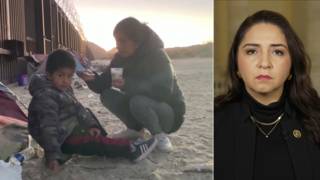
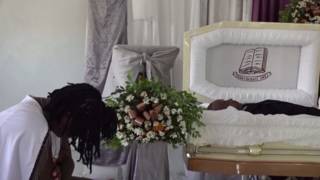
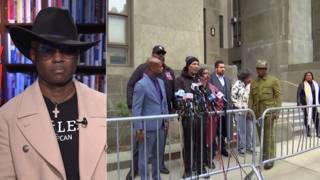
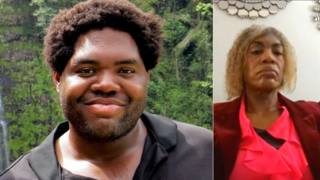





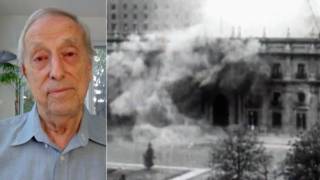
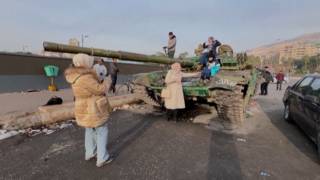
Media Options